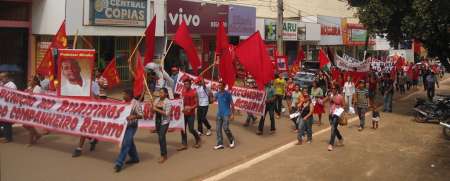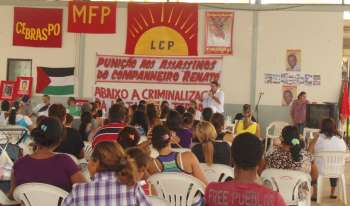The struggle for land and the brutal suppression of the peasant population: the ongoing account of the reality of the agrarian question in Brazil
The huge monopolisation of the land ownership by the ”Latifundio” (the big landowners) in Brazil continues to rise and it is the basis of the history of the ongoing economic and social crisis in the country and, it is at the same time, the basis of current intensification conflicts. Only 2% of landowners (around 23,000) with properties above 1000 hectares hold almost 50% of all land titles in the country (210.5 million hectares)! While 90% of those (4.95 million peasant families), small holders (with properties of up to one hundred hectares) hold only 20% of them (84.1 million hectares)! The medium landowners (with properties of a hundred thousand hectares) that are 8% (440.000) hold the remaining 125.9 million hectares. Besides this there are about 5 million landless peasant families.(*)
This structure of land ownership, that maintains and reproduces the archaic semi-feudal system, is the basis on which imperialism has developed bureaucratic capitalism – that is backward capitalism through which monopoly capital, i.e. imperialism, has imposed in dominated countries. Capitalism, of the bureaucratic type, was developed in Brazil when capitalism had passed to its monopoly stage, i.e. the imperialist phase – in the late nineteenth century and early twentieth century.
It was propelled forwards mainly by British imperialism in alliance with the big landowners (the rural landowning oligarchies) and large local merchants and importers. The nascent bourgeoisie was weak and having stagnated because capital was already in the imperialist phase, could not advance forward the bourgeois revolution in Brazil. It is also true that the nascent proletariat was unable to lead and advance the national-democratic revolution to its end, leaving it in an incomplete state. This was caused by the weaknesses of the Communist Party, which did not understand its role. A role that under the circumstances at the time demanded that a bourgeois revolution could only be carried out under its leadership. A revolutionary leadership that was based on the worker-peasant alliance and a united front with the small and medium bourgeoisie, conducted through revolutionary armed struggle in order that, on the one hand, it must remove the domination of landowners, destroy the old relations of land ownership, give the land to those who work on it and free the productive forces of the field. On the other hand, it must wipe the imperialist domination and confiscate all the bureaucratic capital (state and non-state), centralizing everything in the hands of the new popular state to promote a new self-reliant economy geared to serve the welfare of the people, advancing new democracy and promote a new culture.
Without these tasks being fulfilled, the fundamental and root causes of the contradictions remain intact, semi-feudal relations continue to remain with some evolution in its forms, consequently determine that Brazil would continue to remain a backward country. Under such conditions all that is called development and industrialization has only deepened the denationalization of the economy and its subjugation to mainly American imperialism. Continue reading


